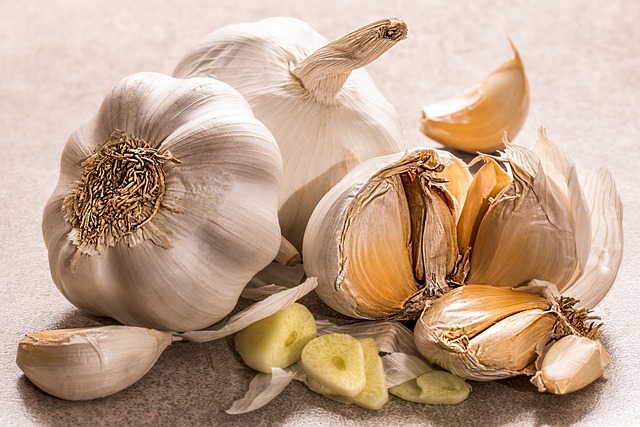11 Proven Health Benefits of Garlic.Garlic is a popular ingredient in many cuisines around the world and has been used for centuries for its medicinal properties.
- Rich in Nutrients: Garlic is a low-calorie food but packed with essential nutrients such as manganese, vitamin B6, vitamin C, selenium, and fiber.
- Antioxidant Properties: Garlic contains antioxidants that help protect the body from oxidative damage caused by free radicals, reducing the risk of chronic diseases.
- Immune System Support: The compounds in garlic can boost the immune system, helping the body defend against illnesses like the common cold and flu.
- Heart Health: Garlic has been shown to have a positive impact on heart health by reducing blood pressure, cholesterol levels, and inflammation, thus lowering the risk of heart disease.
- Improved Circulation: Garlic can enhance blood flow and improve circulation, promoting overall cardiovascular health.
- Reduced Risk of Certain Cancers: Some studies suggest that garlic consumption may lower the risk of certain cancers, particularly those of the digestive system.
- Detoxification: Garlic aids in the detoxification process by supporting the liver in removing harmful toxins from the body.
- Anti-Inflammatory Effects: The compounds in garlic have anti-inflammatory properties, potentially helpful in reducing inflammation in various parts of the body.
- Antibacterial and Antiviral Properties: Garlic’s natural antibacterial and antiviral properties can help fight infections and support overall health.
- Improved Bone Health: Garlic may have a positive impact on bone health, as some studies suggest it can increase bone density and reduce the risk of osteoporosis.
- Improved Digestive Health: Garlic can help improve digestion and support a healthy gut due to its prebiotic properties, promoting the growth of beneficial gut bacteria.
It’s important to note that while garlic has numerous health benefits, it should not be used as a substitute for medical treatment. If you have specific health concerns or conditions, it’s essential to consult with a healthcare professional for personalized advice. Additionally, individual responses to garlic can vary, and excessive consumption may lead to digestive issues for some individuals. As with any dietary change, moderation is key.

- Management of Blood Sugar Levels: Garlic has been studied for its potential to improve insulin sensitivity and aid in managing blood sugar levels. This may be beneficial for individuals with diabetes or those at risk of developing the condition.
- Respiratory Health: Garlic’s antimicrobial properties can be helpful in supporting respiratory health. It may alleviate symptoms of respiratory infections and even help reduce the frequency of colds and coughs.
- Brain Health and Cognitive Function: Some studies suggest that garlic consumption may have a positive impact on brain health and cognitive function. It may help protect against age-related neurological disorders.
- Weight Management: Garlic’s ability to enhance metabolism and reduce unhealthy fat may aid in weight management efforts when combined with a balanced diet and regular exercise.
- Skin Benefits: Applied topically, garlic’s antimicrobial properties can help in treating acne and other skin infections. However, caution should be exercised to avoid skin irritation.
- Hair Health: Garlic’s rich nutrient content, particularly sulfur compounds, can contribute to healthier hair growth and may reduce hair loss.
- Alleviation of Cold Sores: Some research suggests that applying garlic extract to cold sores could help speed up the healing process.
- Anti-Cancer Potential: Studies have shown that garlic contains certain compounds that may have anti-cancer effects by inhibiting the growth of cancer cells and reducing the risk of certain cancers.
- Anti-Fungal Properties: Garlic’s natural anti-fungal properties may help combat fungal infections, such as athlete’s foot and yeast infections.
- Pregnancy Benefits: Limited research suggests that garlic consumption during pregnancy may have positive effects on fetal development and reduce the risk of pre-eclampsia.
- Improved Athletic Performance: Some studies suggest that garlic supplementation may enhance exercise performance by reducing fatigue and improving endurance.
It’s important to remember that while garlic has numerous health benefits, it should be used in conjunction with a balanced diet and a healthy lifestyle. Additionally, garlic supplements should be used with caution, and it’s always best to obtain nutrients from natural food sources whenever possible.
As with any dietary change or supplementation, it’s advisable to consult with a healthcare professional, especially if you have specific health conditions or concerns. They can provide personalized guidance and ensure that garlic consumption is safe and appropriate for you.
- Joint Health: Garlic’s anti-inflammatory properties may benefit individuals suffering from arthritis and other joint-related conditions by reducing inflammation and discomfort.
- Liver Protection: Garlic has been shown to have protective effects on the liver, helping to maintain its health and function.
- Digestive Aid: Consuming garlic can help stimulate the production of digestive enzymes, promoting better digestion and nutrient absorption.
- Wound Healing: Topical application of crushed garlic on minor wounds may aid in the healing process due to its antimicrobial and anti-inflammatory properties.
- Lowering Triglyceride Levels: Garlic supplementation has been associated with a reduction in triglyceride levels, which is beneficial for heart health.
- Balanced Blood Clotting: Garlic can help improve blood circulation and prevent abnormal blood clotting, reducing the risk of certain cardiovascular conditions.
- Improved Sleep: Some people find that garlic consumption promotes better sleep patterns and helps combat insomnia.
- Natural Insect Repellent: Garlic’s strong aroma can act as a natural repellent for certain insects, such as mosquitoes and ticks.
- Alleviation of Ear Infections: Garlic oil drops are sometimes used to help ease ear infections and reduce pain and inflammation.
- Diuretic Properties: Garlic can act as a mild diuretic, promoting the elimination of excess water and salt from the body.
- Fighting Respiratory Infections: The sulfur compounds in garlic have been shown to help combat respiratory infections and ease symptoms.
- Bone Strength and Density: Garlic’s nutrient content, including calcium, may contribute to maintaining strong and healthy bones.
- Enhanced Nutrient Absorption: Some studies suggest that garlic may improve the body’s ability to absorb essential nutrients from other foods.
- Reduction of Lead Toxicity: Garlic supplementation has shown potential in reducing lead toxicity in the body.
- Stress Reduction: Garlic may help alleviate stress and anxiety by influencing certain neurotransmitters in the brain.
It’s important to incorporate garlic into a balanced and varied diet rather than relying solely on garlic supplements to reap its health benefits fully. While garlic offers many advantages, it’s essential to remember that individual responses to garlic can vary, and excessive consumption may cause digestive discomfort for some individuals.

As always, if you have specific health concerns or conditions, it’s best to consult with a healthcare professional before making significant changes to your diet or lifestyle. They can provide personalized advice and ensure that garlic consumption is safe and suitable for your particular health needs.
- Anti-Aging Properties: Garlic’s antioxidants may help combat oxidative stress, contributing to healthier skin and potentially slowing down the aging process.
- Improved Sexual Health: Garlic has been traditionally used as an aphrodisiac and is believed to enhance libido and sexual performance.
- Thyroid Health: Some studies suggest that garlic may have a positive impact on thyroid function, aiding in the regulation of hormones.
- Management of Hypertension: Garlic’s ability to relax blood vessels and reduce blood pressure may be beneficial for individuals with hypertension.
- Enhanced Nutrient Retention in Vegetables: Adding garlic to vegetable dishes can help retain more nutrients during cooking, making the vegetables even more nutritious.
- Natural Remedy for Acne: Applying garlic paste or garlic-infused oil on acne-prone skin may help reduce inflammation and bacteria, potentially improving the appearance of acne.
- Reduction of Allergic Reactions: Some studies suggest that garlic may help modulate the immune response and reduce the severity of allergic reactions.
- Natural Pesticide: Garlic’s strong aroma can act as a natural deterrent for pests in gardens and crops.
- Soothes Toothaches: Applying garlic paste to aching teeth or gums may provide temporary relief due to its antimicrobial properties.
- Improved Memory and Cognitive Function: Some research indicates that garlic may have a positive impact on memory and cognitive abilities, potentially benefiting brain health.
- Gastrointestinal Health: Garlic consumption may promote a healthy gut environment, reducing the risk of gastrointestinal issues.
- Support for Cholesterol Metabolism: Garlic compounds may aid in the metabolism of cholesterol, contributing to a healthier cholesterol profile.
- Natural Decongestant: Consuming garlic or garlic-infused remedies may help relieve nasal congestion and sinus pressure.
- Reduction of Bad Breath: Contrary to popular belief, garlic consumption in moderation may help combat bad breath due to its antibacterial properties.
- Insect Bite Relief: Applying crushed garlic to insect bites may help soothe irritation and reduce itching.
- Improved Iron Metabolism: Some studies suggest that garlic can enhance the body’s utilization of iron from plant-based sources.
- Balanced Blood Sugar Levels during Pregnancy: Garlic’s potential to aid in blood sugar management may be beneficial for pregnant individuals with gestational diabetes.
Remember that while garlic offers numerous health benefits, it is not a substitute for medical treatment or advice. It is a complementary addition to a healthy lifestyle and should be enjoyed as part of a balanced diet. If you experience any adverse reactions to garlic or have specific health concerns, it’s essential to seek guidance from a healthcare professional. They can provide tailored recommendations based on your individual health status.

